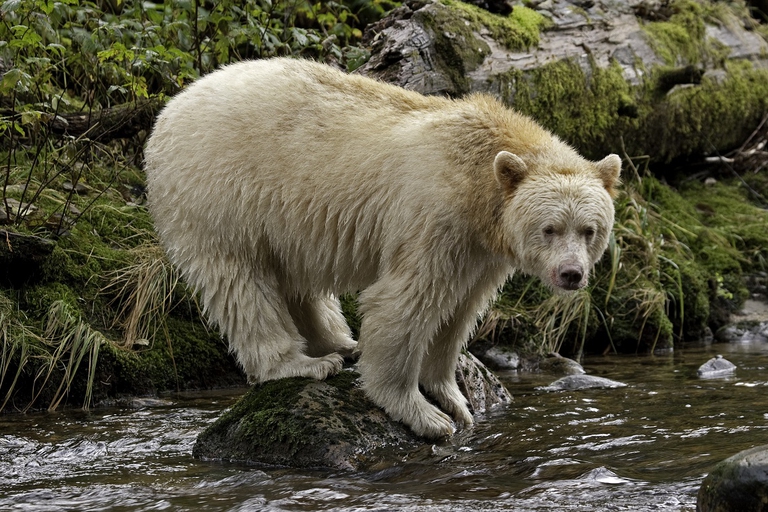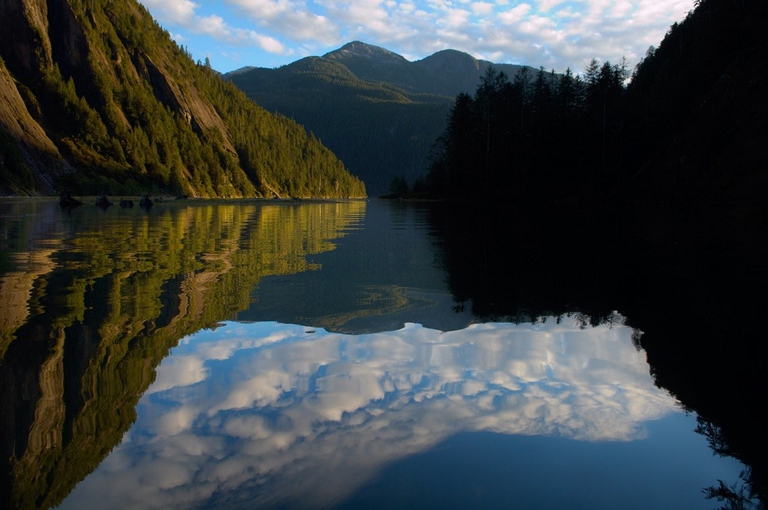
Our species took its first steps in a world covered in trees. Today, forests offer us sustenance, shelter, and clean the air that we breathe.
Grazie ad un accordo tra il governo, i nativi e le imprese forestali, l’85 per cento della Great Bear Rainforest è stato dichiarato protetto.
If you look absent-mindedly at a picture of this bear, you may wonder why a Polar bear roams a temperate forest. Actually, it’s a Kermode bear (Ursus americanus kermodei), a subspecies of the American black bear that almost exclusively lives in the Great Bear Rainforest, British Columbia, Canada.
The Kermode bear, whose coat whiteness is due to a recessive gene common to its population, is also referred to as the “spirit bear”, and has a high spiritual and mythological value for native populations that have been sharing the forest with these animals for centuries. This unique, uncontaminated area, which extends for about 3 million hectares (the size of Belgium), is one of the world’s largest temperate rainforests. And today is finally being protected.
After 20 years of requests and conflict, the First Nations (indigenous populations of today’s Canada), the government, forestry companies, and environmental associations signed a landmark agreement: 85% of the Great Bear Rainforest will be protected from industrial logging. The agreement, announced by the province of British Columbia along with First Nations’ governments, has been achieved also thanks to the support of the environmental associations Greenpeace, Forest Ethics and Sierra Club British Columbia.
This is a historic victory. Less than two decades ago, over 95% of the Great Bear Rainforest wasn’t protected, and loggers used to cut down dozens of thousand-year trees. The forest protection is also crucial for fighting the effects of climate change. In fact, it will prevent about 640,000 tonnes of CO2 to be released into the atmosphere every year.
“We finally have a science-based forest management system that recognizes the importance of maintaining old-growth forest in place,” said Nicolas Mainville, activist of Greenpeace Canada.
Those bizarre cream-coloured bears, which have never been hunted by natives for spiritual reasons, will thus roam the forest for centuries to come.
Siamo anche su WhatsApp. Segui il canale ufficiale LifeGate per restare aggiornata, aggiornato sulle ultime notizie e sulle nostre attività.
![]()
Quest'opera è distribuita con Licenza Creative Commons Attribuzione - Non commerciale - Non opere derivate 4.0 Internazionale.
Our species took its first steps in a world covered in trees. Today, forests offer us sustenance, shelter, and clean the air that we breathe.
The Canadian province of British Columbia has banned grizzly bear hunting in all its forms. According to the Environment Minister, bears are worth more alive.
AXA, one of the world’s biggest financial services companies, is dumping investments in tar sands and ending insurance for controversial oil pipelines, taking fossil fuel divestment to new heights.
Poachers in Africa are encroaching on wildlife land and killing rhinos in travel hot spots now devoid of visitors due to the coronavirus pandemic.
Actor and environmental activist Leonardo DiCaprio has contributed two million dollars to a fund to protect Virunga National Park in Congo from threats such as terrorism, the coronavirus and poaching.
For the first time in seventeen years, Iceland’s two main whaling companies won’t resume whale hunting. The announcement concerns this year’s season but could carry into the future.
The relationship between the coronavirus and wildlife is complex: while the pandemic may lead to a reduction in the illegal trade in wild animals, it may also encourage it in other respects.
The largest coral reef in the world is severely threatened by climate change, but researchers are developing strategies that could contribute to saving the Great Barrier Reef.
NGO Free the Bears has opened a mountain sanctuary for moon bears in Laos. With the government’s help, it aims to close all bile farms by 2022.









